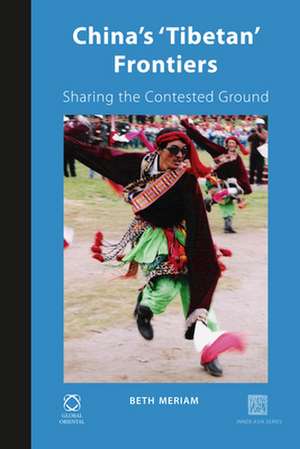China's 'Tibetan' Frontiers: Sharing the Contested Ground: Inner Asia Book Series, cartea 6
Autor Beth Meriamen Limba Engleză Hardback – 8 dec 2011
Preț: 564.85 lei
Preț vechi: 688.84 lei
-18% Nou
Puncte Express: 847
Preț estimativ în valută:
108.09€ • 115.58$ • 90.12£
108.09€ • 115.58$ • 90.12£
Carte indisponibilă temporar
Doresc să fiu notificat când acest titlu va fi disponibil:
Se trimite...
Preluare comenzi: 021 569.72.76
Specificații
ISBN-13: 9781906876302
ISBN-10: 1906876304
Pagini: 334
Dimensiuni: 160 x 240 mm
Greutate: 0.98 kg
Ediția:New.
Editura: Brill
Colecția Brill
Seria Inner Asia Book Series
ISBN-10: 1906876304
Pagini: 334
Dimensiuni: 160 x 240 mm
Greutate: 0.98 kg
Ediția:New.
Editura: Brill
Colecția Brill
Seria Inner Asia Book Series
Cuprins
Acknowledgements; List of Plates; A Note on Transliteration and Transcription; Abbreviations; Map of Qinghai within China; Map of Yushu within Qinghai; Map of Yushu Tibetan Autonomous Prefecture; Outline Map of Trinde County Town; Preface; Introduction: Opening Vistas, Bordering Spaces; 1: Reclassified Societies; 2: Stressing Development; 3: Cultivating Nationalities; 4: Civilizing Culture; 5: Empowering Locales; 6: Other Modernities; 7: Revisualizing Nationalities; Conclusion; Appendix 1: Chronology of China’s Reform Era; Appendix 2: Glossary of Principal Political Terms; Bibliography
Notă biografică
Beth Meriam is a published writer, anthropologist and researcher. Since 1994, she has worked widely across the Himalayan and Tibetan cultural region. Her 1998-99 investigation of culture, development and education in Ladakh was awarded the James Littlejohn Prize (Edinburgh, 1999). In 2001, she published ‘Culture’ Matters: Developing Ladakhi Education on the Margins of India via the University of Edinburgh, which was the culmination of an in-depth research project. Dr. Meriam was awarded a Cambridge University doctorate that included research undertaken while living and working with pastoralists on the Tibetan plateau, and she continued as a Research Associate at Cambridge between 2006 and 2009.
Descriere
This pioneering ethnographic analysis provides a far-reaching account of the changing social, political and organizational topography of western China. The seismic changes wrought across this region in recent history are seen through the lens of Trinde, a remote ‘autonomous’ county on the Tibetan plateau. Drawing on over two years of detailed empirical research in a region never previously investigated by foreign researchers, Beth Meriam traces and interlinks the human, national and global dimensions of continuity and change. Her work provides important new insights into how the challenges and opportunities of China’s reform era are producing innovative social and political responses from the people in this area.
This sensitive, controversial work provides a rare and intimate account of a highly diverse range of people, and highlights their central role in shaping this dynamic, changing society. Set in a region that is never long out of the headlines, the ethnography vividly illustrates how policy fluctuations across this region involve difficult, and often painful, dilemmas for local people. Synthesizing anthropological insight with Tibetological rigour, the study shows how policies and social categories are anything but self-evident or monolithic: instead, local people are actively engaged in creating, reinterpreting and modifying official policies in practice.
The book will be of interest to a wide audience, including students and scholars of Chinese nationality studies and Tibetology, as well as those with an interest in social and political anthropology or who are looking for a penetrating and integrated analysis of this hotly-debated and often misunderstood region.
This sensitive, controversial work provides a rare and intimate account of a highly diverse range of people, and highlights their central role in shaping this dynamic, changing society. Set in a region that is never long out of the headlines, the ethnography vividly illustrates how policy fluctuations across this region involve difficult, and often painful, dilemmas for local people. Synthesizing anthropological insight with Tibetological rigour, the study shows how policies and social categories are anything but self-evident or monolithic: instead, local people are actively engaged in creating, reinterpreting and modifying official policies in practice.
The book will be of interest to a wide audience, including students and scholars of Chinese nationality studies and Tibetology, as well as those with an interest in social and political anthropology or who are looking for a penetrating and integrated analysis of this hotly-debated and often misunderstood region.













